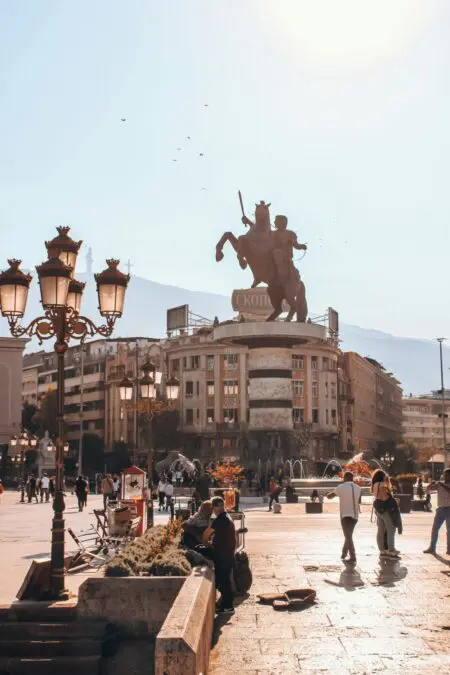Lawmakers in North Macedonia approved the new nationalist-dominated government of Prime Minister Hristijan Mickoski, whose party won parliamentary elections in May, riding on voter anger at the slow pace of European Union integration, reported Reuters.
After a third vote and a technical problem with the electricity, the final result was 77 votes to 22 in the 120-seat parliament, where the ruling coalition consists of Mickoski’s party VMRO-DPMNE, the Albanian alliance VLEN/VREDI and ZNAM, an ethnic Macedonian breakaway from the Social Democratic Party (SDSM).
Declaring the session “historic”, Mickoski, who is in his first term as prime minister, told MPs it was time to “roll up their sleeves and start solving the problems in the country”.
He said his government, made up of 20 ministries, would not need 100 days to show results in reforms, but would start working immediately to attract new investment, cut taxes and increase pensions and wages.
Mickoski stated that the government will remain committed to European integration.
“We continue to stand together with our EU partners and together we will harmonize the common foreign policy with the EU,” he said, adding that his country would continue to support Ukraine’s defense against Russian invasion.
But Mitkoski also said that the previously agreed deal to settle the dispute with Bulgaria by changing the constitution to recognize a Bulgarian minority “will not pass and there will be no constitutional changes while I am here.”
Opposition lawmakers have cast doubt on the new government’s ability to deliver on its program promises, accusing Mickoski of being manipulative and keeping proposed reforms secret.
VMRO-DPMNE has been in opposition since 2017, when Nikola Gruevski’s government was ousted after the 2016 election over alleged corruption and replaced by the SDSM-led government.
Nikola Gruevski, a right-wing nationalist who fled the country in 2018 after being sentenced to two years in prison on corruption charges, has been granted political asylum in Hungary.
After boycotting VMRO-DPMNE in recent years over concerns that its nationalist leanings could damage relations with EU neighbors Greece and Bulgaria and the country’s bid for EU membership, voters have turned left to right in frustration with the slow development and delay of EU integration.
According Mickoski: A bilateral treaty being part of a negotiating framework with the EU is a precedent. Changes to the Constitution will be made after North Macedonia becomes a member of the Community.
Mickoski has on several occasions referred to the Balkan nation of 2 million simply as Macedonia, without giving its full name North Macedonia, which the previous government changed under pressure from Greece, which claimed the name implied territorial claims to the Greek province of the same name.
Greece has already warned it could block North Macedonia’s bid to join the EU after its neighbour’s newly elected president, Gordana Siljanovska-Davkova, also called her country “Macedonia”, reigniting a dispute with Athens over the name.
MFA: Bulgaria has no new conditions for the RNM, but wants to see progress on the old ones. According to the Bulgarian Foreign Ministry, the manipulative presentation of the conditions from 2022 is particularly dangerous.
The so-called a French proposal, with which the agreed between the RNM and Bulgaria to change the Constitution and the inclusion of Bulgarians as a minority, was voted by the 47th National Assembly in Sofia and became part of the Negotiation Framework for membership in the European Union for our southwestern neighbor. The Bulgarian media recall, proposal itself was adopted with 170 votes “for”, supported by GERB, “We continue the change”, Democratic Bulgaria and DPS, opposed by “Vazrazhdane” and “There is such a people”, and BSP abstained. However, the vote also became a dividing line in our country, as it was followed by the withdrawal of ITN from Kiril Petkov’s government and a successful vote of no confidence.
Illustrative Photo by Beyzanur Gazioğlu Balcı: https://www.pexels.com/photo/monument-of-man-on-a-horse-in-macedonia-19743461/







